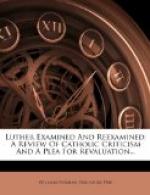who is the end of the Law for righteousness to every
one that believeth (Rom. 10, 4), and he falls under
the curse of God for placing his own merits alongside
of the merit of the Redeemer’s sacrifice.
In no other connection has Luther spoken against good
works. He has rather taught men how to become
fruitful in well-doing by the sanctifying grace of
God and according to the inspiring example of the
matchless Jesus. Concerning the Law, Luther preached
1 Tim. 1, 9: “The Law is not made for a
righteous man,” that is, Christians do the works
of the Law, not for the Law’s sake, but for
the sake of Christ, whom they love and whose mind
is in them. They must not be driven like slaves
to obey God, but their very faith prompts them to
live soberly, righteously, and godly in this present
world (Tit. 2, 12). But Luther always held that
the rule for good works is laid down in the holy Law
of God, and only in that; also that the Law must be
applied to Christians, in as far as they still live
in, the flesh, and are not become altogether spiritual.
Luther’s public activity as a preacher began
with a series of sermons on the Ten Commandments,
and this effort to expound the divine norm of righteousness
was repeated several times during Luther’s life.
Luther’s expositions of the Decalog are among
the finest that the world possesses. Moreover,
Luther wrote the Small Catechism. Hand any Catholic
who talks about Luther having abolished the Ten Commandments
this little book. That is a sufficient refutation.
What Luther teaches in this book he has given his
life to reduce to practise in himself and others.
He says in a sermon on Easter Monday, 1530: “When
rising in the morning, I pray with my children the
Ten Commandments, the Creed, the Lord’s Prayer,
and some Psalm. I do this because I want to make
myself cling to these truths. I shall not suffer
my faith to become mildewed with the imagination that
I am above these things (
dass ich’s koenne).”
His sermon on the First Sunday in Advent in the same
year he begins thus: “Dear friends, I am
now an old Doctor, still I find every day that I must
recite with the children the Ten Commandments, the
Creed, and the Lord’s Prayer, and I have always
derived a great benefit and blessing from this practise.”
(12, 1611. 1641.)
Luther is charged with mendacity, that is, he is said
to have lied. The reasons that will be given
for this charge, when called for, will probably be
these: Luther at various times in his life gave
three different years as the year of his birth, three
different years as the year when he made his journey
to Rome, and advised somebody in 1512 to become a
monk when he had already commenced to denounce the
monastic life: It is true that Luther did all
these things, but it is also true that Luther believed
himself right in each of his statements. He was
simply mistaken. Other people have misstated the
year of their birth without being branded liars on
that account. Sometimes even a professor forgets
things, and Luther was a professor. What Luther
has said about the rigor of his monastic life is perfectly
true, but it was no reason why in 1512 he should counsel
men to become monks. He had not yet come to the
full knowledge of the wrong principles underlying that
mode of life. To adduce such inaccuracies as
evidence of prevarication is itself an insincere act
and puts the claimant by right in the Ananias Club.




